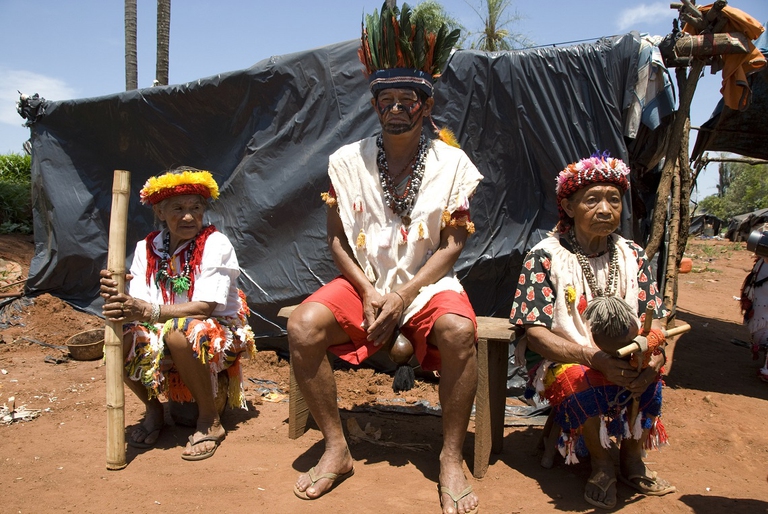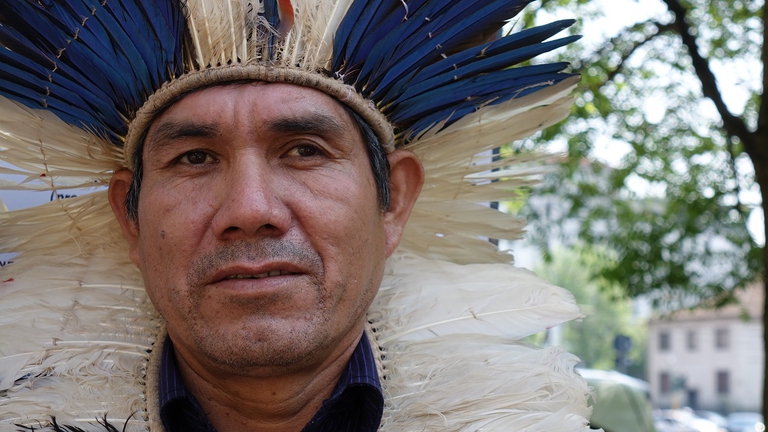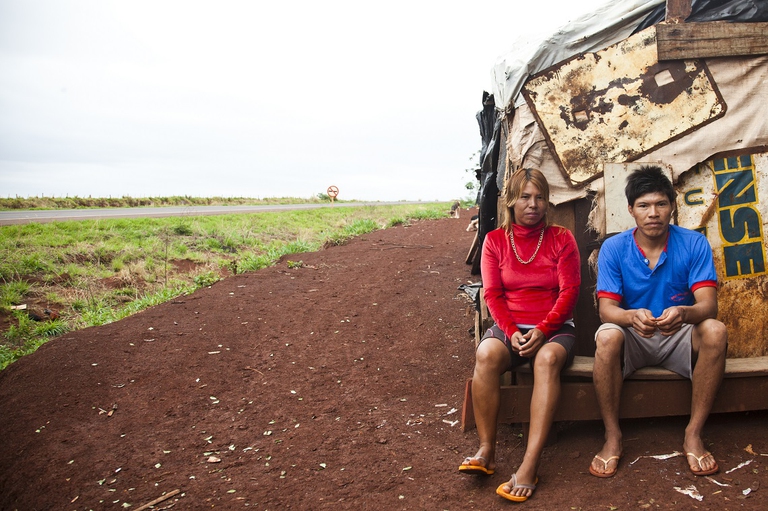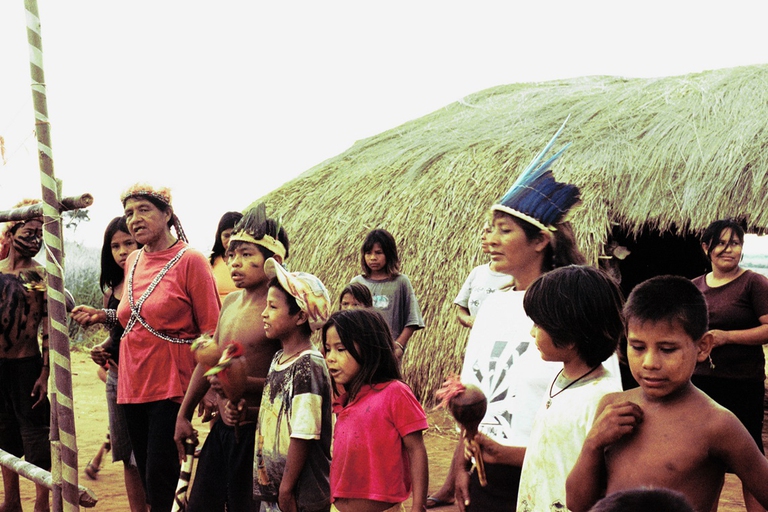
A special report from the Yuqui territory delves deep into the dreams, challenges, joys and sadness of one of Bolivia’s most vulnerable indigenous groups.
In Brasile la situazione per i guaraní, il popolo indigeno più numeroso del Paese, è drammatica, privati delle loro terre ancestrali e assassinati impunemente dai proprietari terrieri.
The Guaraní people have lived in South America’s rainforests from time immemorial, depending on what nature offered them – until Europeans’ arrival. At that time the Guaraní tribe was composed of 1.5 million people, distributed across Paraguay, Brazil, Bolivia, and Argentina. Today, only a few tens of thousands survive. The Brazilian Guaraní are divided into three groups, and the most populous one is the Kaiowá in Mato Grosso do Sul.
The Brazilian Guaraní have been almost entirely deprived of their ancestral lands, which have been deforested and seized by farmers who forced natives to live in cramped reservations established by the government in the outskirts of cities. These small lands aren’t enough for their sustenance. In fact, children suffer from severe forms of malnutrition and these areas register one of the world’s highest suicide rates (since 1986, more than 517 Guaranís killed themselves, including a child aged 9). The Guaraní Kaiowá tribe can’t live far from its forests (Kaiowá means “people of the forest”, indeed) and, tired of negotiating and waiting for the government’s intervention in vain, has decided to peacefully take its lands back. However, the response to such “retomada” was cruel and natives have become victims of violent reactions by land owners and their hit men.
The Guaraní are currently victims of a genocide that is taking place in a deafening silence. Within just a few years, when the people of the forest will be wiped out, we’ll celebrate their memory as we always do, with words dressed up in rhetoric about how things like these should not happen again, just until next time. But the Guaraní don’t want and shouldn’t be yet another monument to human inability of learning from its own mistakes. This is precisely why indigenous leader Ládio Veron, spokesman of the Guaraní Kaiowá, came to Europe, with the aim of raising awareness on the violence its community is forced to endure and the situation that could even get worse due to the adoption of a constitutional amendment (PEC 215). We met him in Milan, Italy, thanks to Survival, the global movement for tribal peoples’ rights. His voice is profound and ancient, as if it were rooted in the fertile soil of Mato Grosso rainforests, showing an unbreakable bond with the jungle, because as he says: “We, the Guaraní, are the forest”.
Why is the forest so important for the Guaraní’s survival?
The life of natives has no sense without the forest. We live in the forest, we are the forest, we are nature, we talk to trees and treat them as members of our family. To us, the forest means life and home. We and the forest are one, and we can’t exist separately.
What consequences would PEC 215 have on Brazilian indigenous peoples?
If this amendment is approved, it will further weaken our control on the lands we depend on for our livelihoods. So, it could prevent us from take back the lands they’ve stolen from us.
The Guaraní are victims of violence and threats by landowners. Is the government protecting you?
Absolutely not, because the government wants our ancestral lands.
The Guaraní Kaiowá are the descendants of those natives who refused to join Jesuit missionaries in the late 7th century. Despite decades of contact with foreigners, you maintained your identity. How?
Our people have always handed down their culture, customs, way of life, and the way of singing and being Guaraní. We don’t want to live in any other way. This is what we were and this is what we want to continue to be.
Your culture is characterised by non-violence and spirituality. How can you endure the violence you’re subjected to?
There isn’t a “right way” of facing this situation and such violence. Landowners have our leaders and the most defenceless and innocent part of our community – children – killed. We just want to live peacefully in our lands, but the government wants to take them away. And in doing so, it hits our leaders and our children.
What makes you continue fighting while knowing you your life is at risk?
I’m the son of a leader who was killed, Marcos Veron. I continue this fight because it’s his mission, the legacy my father handed down to me. He started this fight many years ago and I must continue it. It’s my duty. I know that in Brazil they want to kill me, but I’m not afraid. At the moment, it’s important for me to travel across Europe to raise awareness on what is taking place in Brazil and what my people is suffering.
Siamo anche su WhatsApp. Segui il canale ufficiale LifeGate per restare aggiornata, aggiornato sulle ultime notizie e sulle nostre attività.
![]()
Quest'opera è distribuita con Licenza Creative Commons Attribuzione - Non commerciale - Non opere derivate 4.0 Internazionale.
A special report from the Yuqui territory delves deep into the dreams, challenges, joys and sadness of one of Bolivia’s most vulnerable indigenous groups.
The Yuqui people of the Bolivian Amazon fight not only to survive in the face of settlers, logging and Covid-19, but to preserve their culture and identity.
Jair Bolsonaro is accused of crimes against humanity for persecuting indigenous Brazilians and destroying the Amazon. We speak to William Bourdon and Charly Salkazanov, the lawyers bringing the case before the ICC.
Activists hail the decision not to hold the 2023 World Anthropology Congress at a controversial Indian school for tribal children as originally planned.
Autumn Peltier is a water defender who began her fight for indigenous Canadians’ right to clean drinking water when she was only eight years old.
The pandemic threatens some of the world’s most endangered indigenous peoples, such as the Great Andamanese of the Andaman and Nicobar Islands in India.
The Upopoy National Ainu Museum has finally opened. With it the indigenous people of Hokkaido are gaining recognition but not access to fundamental rights.
A video shows the violent arrest of indigenous Chief Allan Adam, who was beaten by two Royal Canadian Mounted Police (RCMP) officers.










